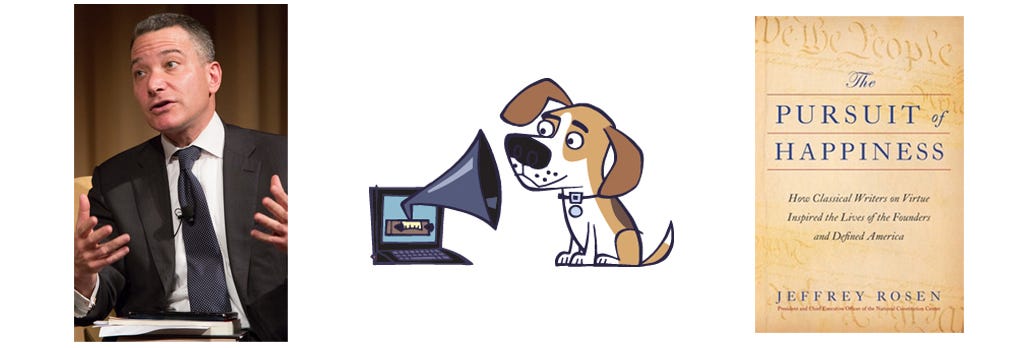Jeff is the president and CEO of the National Constitution Center, where he hosts “We the People,” a weekly podcast of constitutional debate. He is also a professor of law at the George Washington University Law School, and a contributing editor at The Atlantic. A former house-mate of mine and friend for 40 years, Jeff began his journalistic career writing some stellar essays on the Supreme Court in the TNR when I was editor. The author of many books, his new one is The Pursuit of Happiness: How Classical Writers on Virtue Inspired the Lives of the Founders and Defined America.
You can listen right away in the audio player above (or on the right side of the player, click “Listen On” to add the Dishcast feed to your favorite podcast app). For two clips of our convo — on the transcendence of deep reading in the age of distraction, and the hypocrisy of many Founding Fathers on slavery — pop over to our YouTube page.
Other topics: growing up in NYC with a father who’s a renowned hypnotherapist and a mother who’s a social worker; educated at the Dalton School — “a beacon of liberalism”; reconciling faith with reason; the intellectual tradition in Catholicism; God as reason (logos); Jeff’s deep reading during Covid; Seneca’s essays on time; Cicero’s treatise on old age; Aurelius’ Meditations; Ben Franklin’s 13 virtues; temperance and prudence; Socrates; Plato; Aristotelian balance; Pythagorus; Blazing Saddles; “without virtue happiness cannot be”; Jefferson’s 12 virtues; his rank racism and contradictions over liberty; Sally Hemings; George Wythe freeing his slaves; the Founders building a new society based on ancient wisdom; Cicero at the center of that project; the Bhagavad Gita; the Stoics as Taoist; John Adams as tempestuous and striving for humility; treating his brilliant wife as his equal; making up with his enemies (e.g. Jefferson); Madison and the Federalist Papers; Douglass teaching himself to read; Freud and the substitute of character for personality; delayed gratification; “everything goes to shit in the Sixties”; Gen Z’s pursuit of happiness ending in anxiety; the quiet life of the 18th century vs the “dazzling array of distractions” today; regaining concentration through deep reading; how all the great books of the ancient world are free online; balance, deliberation, and equanimity as keys to good government; the preternatural calm of Obama; the danger of demagogues; Trump as the anti-Christ of liberal democracy and the antithesis of the Founders.
Browse the Dishcast archive for an episode you might enjoy (the first 102 are free in their entirety — subscribe to get everything else). Coming up: Rob Henderson on class and “luxury beliefs,” Christian Wiman on resisting despair as a Christian, George Will on Trump and conservatism, Abigail Shrier on why the cult of therapy harms children, Adam Moss on the artistic process, and Richard Dawkins on religion. Please send any guest recs, dissents, and other pod comments to dish@andrewsullivan.com.
Here’s a listener on last week’s pod with Nate Silver:
To double down on one of Silver’s points: poker is a great unifier. In an America that is increasingly balkanized and dulled by phone addiction, can you name another pastime that brings together, in close physical proximity, old and young, red and blue, every race, class and educational level, new immigrants and WASPs, roughnecks, crypto bros and Charles Murray (as you discussed with him) — all fiercely engaged around a table for hours at a time? I can’t.
The sole exception, as Silver mentions, is women. Few play. Like most female players, he attributes this to male toxicity. It is, in fact, mainly a class issue. I have seen plenty of boorish behavior in poker, but it’s almost totally confined to lower stakes and directed at everyone, not just women. And Karens also play poker. Many of the outrages one reads about on feminist poker Twitter are of the micro-aggression variety. I have never seen a woman being openly disrespected at the table, and my sample size is in the many thousands of hours.
I suspect female players do better than most men. As Silver points out, they can use as a weapon the stereotype of them playing tight and not bluffing. The hot ones become social media stars and snag big sponsorships.
Should more women play? Probably not. IQ differences between the sexes probably matter less here than temperamental differences, like agreeableness. Women account for much more than 1% of poker players, but no women reside on the list of the top 100 all-time tournament money winners. (The Judit Polgar of poker is Vanessa Selbst — a butch lesbian who would be in the top 100 had she not joined a hedge fund.) Whatever sex differences are keeping women out of the top echelons of chess are probably also at work in poker. The blank slatists blame the patriarchy, of course.
If we saw a huge influx of women into poker, inexperienced female players would get slaughtered and lose a ton of money to experienced male players. So is the push to get more women into the game really about feminism, or just virtue signaling? Or, is it about fleecing daughters, wives, and mothers?
Here’s a listener on another theme of the Nate convo — “about young gay people feeling more miserable than we did, even though there are more freedoms”:
Life is better now for gay men because the overt mechanisms of oppression are gone. Currently there is more openness — perceived as a good thing, but which also includes the pressure to be out at school, out at work, out to your family, out to the public, get married (someday), maybe adopt kids, all of it. We had none of that. We had just a few choices mostly concerning survival, which was hard, but simple, uncomplicated, and included not sharing personal information except with your closest confidants and other gay people. These days, gay men feel pressure to share, defend, explain, and promote. That requires a lot of energy, commitment, and vulnerability.
When asked about the depression that young gay men feel and why, Nate Silver references going to nightclubs five times per week, when he first came out. (That was my experience too.) That’s a lot of face-time with others. Social life for most young people now, gay men included, involves social media, technology and dating apps, which means relating to others “second-hand.” That likely contributes to increased alienation and anxiety. They must figure out how to resolve it, just like we did.
A dissent over another episode:
Thanks for your conversation with Isikoff and Klaidman. But I’d like to push back against your pushing back against them about the seriousness of the threat posed by Trump. To be clear, I very much appreciate your desire to be precise and avoid the vague apocalypticism that characterizes much of the “democracy is on the ballot!” rhetoric, and I’m not trying to defend the latter. But there’s such a thing as the pendulum swinging too far in the opposite direction.
For example, you kept asking them, “But was the Georgia stuff REALLY serious?”
Listen to this episode with a 7-day free trial
Subscribe to The Weekly Dish to listen to this post and get 7 days of free access to the full post archives.













